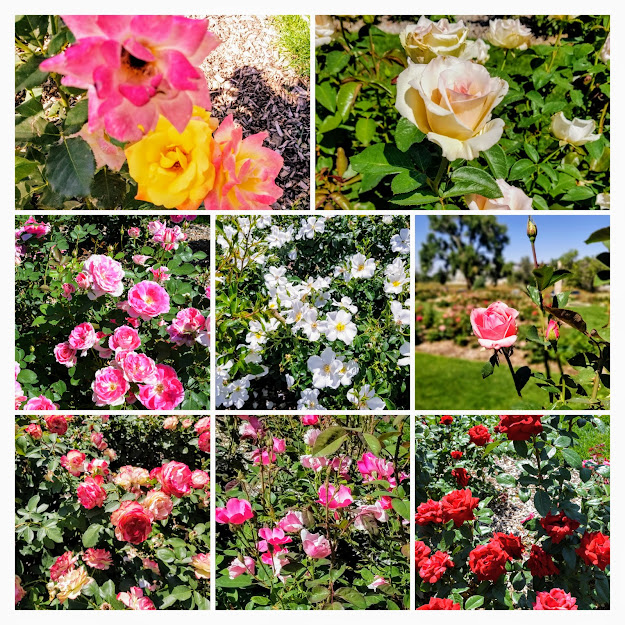Last week I visited the Littleton, Colorado War Memorial Rose Garden, located at 5804 S Bemis Street before a cold front was predicted to descend on our area with possible snow. I had heard about this garden many times but for one reason or another, I never had a chance to visit it. Since we've been staying close to home these days I thought this would be a good opportunity to take a drive across town to finally see it. I was glad I did! What a beautiful and peaceful place to visit. Although it was early September many roses were in bloom and gorgeous.

The War Memorial Rose Garden is one of only two All-American Rose Select designations within the State of Colorado and this makes the garden unique in character for our high desert plains. The park is dedicated to veterans who have served in any of America’s wars. It was purchased by the city of Littleton in 1964 and contains over 1800 roses of all types—hybrid teas, shrub roses, miniatures, old garden roses, species roses, and climbers.
The Orian Sterne fountain (named for the daughter of W. C. Sterne, for whom Sterne Park is named), at the center of the garden, was originally built in front of the Carnegie Library at the west end of old town Littleton on Main Street. It was placed in storage at the Littleton Historical Museum when the Santa Fe/Bowles intersection was reconstructed and then eventually moved to the rose garden in 1988.

The rose is America’s national flower and the world’s favorite flower. It is also the month of June's birth flower, and as a June baby, I've always loved roses.
According to the 120-year-old American Rose Society (ARS), the rose is a universal symbol of love, friendship, beauty, and peace; a flower of unsurpassed importance in art, history, literature, and music.
The rose has been in cultivation for over 5000 years and grown throughout history for medicine, perfumery, as a messenger of romance, and for its sheer beauty. Thousands of varieties of roses exist today.
Roses come in every size from 12-inch miniatures to towering 20-foot shrubs and climbers. They have been bred to every possible shade and combination of reds, pinks, yellows, and whites, with some variety suited to almost any climate in the world.
I enjoyed walking around the War Memorial Rose Garden and admiring all the varieties of roses. Many had plaques to identify their variety located in front of them. The memorial website also has an interactive map with what roses are planted in each section.
In 1995, Dr. William Campbell and South Suburban Parks and Recreation, in addition to numerous individuals and organizations, contributed funds to design and construct a Victorian-style gazebo in honor of his wife Linda Campbell, past president of the Arapahoe Rose Society and Denver Rose Society.
The memorial plaque adjacent to the gazebo reads:
"In Memory of
LINDA CAMPBELL
Hold on to what is good even if it is a handful of earth.
Hold on to what you believe even if it is a tree which stands by itself.
Hold on to what you must do even if it is a long way from here.
Hold on to life even when it is easier letting go.
Hold on to my hand even when I have gone away from you.
Family & Friends"
A large sundial is located just south of the gazebo, which was installed in 1969. The front of the sundial shows summer hours from April until September and the back winter hours October through March.
If you look at this view from the rose garden you can see a hazy view of a portion of the Colorado foothills. The week I visited the War Memorial Rose Garden we were experiencing some smoke in our atmosphere from the Colorado wildfires. If you look beyond the rose garden border there was a private large vegetable and flower garden adjacent to it.
Peeking over that garden's fence were these magnificent sunflowers, along with hops growing on the fence, and a grand Cottonwood tree next to the parking lot.
Of all the roses I saw and enjoyed in the War Memorial Rose Garden, it was hard to choose a favorite, but this rose reminded me of ones that grew in my Mother's backyard so it would definitely be a contender.
In true Colorado "wait fifteen minutes and the weather will change" fashion we did get snow on September 9th! The area where I live had five inches of snow. The temperature went from over 100 degrees to below freezing in 24 hours! We tied an all-time record with Rapid City, South Dakota, for the most extreme weather change in 24 hours! Happily, the weather returned to normal very quickly and the snow melted at our elevation very quickly. We are now back to warm weather in the 80s and we felt grateful for all the moisture from the melting snow as we have been in a drought this summer.
Stay happy, safe, and healthy!
I'm linking this post to some of the following blog events:
Mosaic Monday, All Seasons, Blue Monday, Through My Lens Monday, Little Cottage Link Party, Hearth, and Soul Link Party, You Are the Star Blog Hop, Inspire Me Monday, Home Matters Linky Party, Good Random Fun, Nature Notes, Grand Social, Travel Photos, Happiness Is Homemade, Over the Moon, Create, Bake, Make, Our World Tuesday, Ruby Tuesday, Tuesday Turn About. Tuesdays With A Twist, Let's Keep In Touch, Wordless Wednesday on a Tuesday, Party in Your PJ's, Wordless Wednesday, Nanahood WW, Oh My Heartsie Girl's Wonderful Wednesday, Your Whims Wednesday, Wednesday My Corner of the World, Wonderful Wednesday, Little Things Thursday, Thankful Thursday, Thursday Encouraging Hearts and Home, Thursday Thinking Out Loud, Friendship Fridays, Friday Features Linky Party, Skywatch Friday, Pink Saturday



































